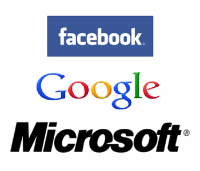Earlier this month several copyright holder groups submitted their overviews of “notorious markets” to the U.S. Trade Representative (USTR).
The U.S. Government uses this input to provide an overview of threats to various copyright industries. The list usually includes well-known piracy sites such as The Pirate Bay, but last year it also mentioned Canadian domain name registrar Tucows.
This year the MPAA and RIAA kept up the pressure with their latest submissions. Both groups again identified domain name registrars as possible piracy facilitators.
The inclusion of domain name registrars is a dangerous development according to the Computer & Communications Industry Association (CCIA), which counts Google, Facebook and Microsoft among its members.
The CCIA submitted a rebuttal to the USTR this week in which they outline their concerns.
“CCIA is deeply concerned with comments requesting that domain registrars be branded as ‘notorious markets’ and included on USTR’s list of notorious markets,” the group writes. “Domain registrars are not notorious markets.”
The tech companies explain that third party service providers enjoy broad immunity from copyright infringement claims, as defined by U.S. law.
USTR’s decision to include domain registrars was based in misleading input from copyright holder groups, CCIA notes. Copyright holders argue that ICANN’s RAA agreement requires registrars to take specific action against alleged abuse, but the tech companies refute that.
“Although some rightsholders have argued that ICANN should deputize registrars as copyright enforcement agents, USTR should not be giving credence, either directly or implicitly, to these misinterpretations of the RAA and the proper role of registrars,” they write.
The MPAA and RIAA went beyond domain registrars in their latest filings and also argued that other service providers should play a more active role in countering online piracy. This includes CCIA member Cloudflare, who has many “notorious” sites among their customers.
CCIA also opposes this request and warns against measures that would involve third-party companies in regulating and policing the Internet, drawing a comparison to the defeated SOPA and PIPA bills.
“Rightsholders have a wide variety of tools to reduce intellectual property infringement. USTR should not allow intellectual property enforcement efforts to interfere with fundamental Internet infrastructure, or undermine the intermediary liability limitations that the U.S. Internet economy is built on.
“Domain registrars, and other third party online intermediaries, do not belong on USTR’s notorious markets list,” CCIA concludes.
The rebuttal and other submissions will form the basis of the U.S. Government’s Special 301 Out-of-Cycle Review of Notorious Markets, which is expected to come out later this year.


 Earlier this month several copyright holder groups submitted their overviews of “notorious markets” to the U.S. Trade Representative (
Earlier this month several copyright holder groups submitted their overviews of “notorious markets” to the U.S. Trade Representative (



